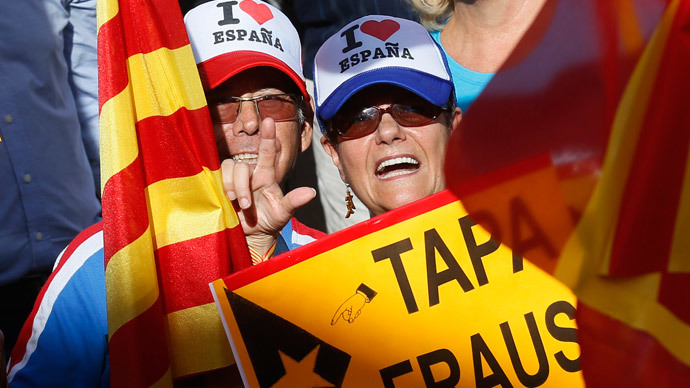‘Reluctance to allow Catalan referendum illustrates Spain’s former empire mentality’

A so-called empire hangover or an empire mentality stops the Spanish government from admitting the Catalan right to hold an independence referendum, which will actually give more respect to Madrid if allowed, Scottish Nationalist MP Angus MacNeil told RT.
It seems that Catalan aspirations for independence are on the wane, given multiple challenges that the independence-seekers have been facing for some time.
It started with the September 29 decision by Spain’s Constitutional Court that suspended Catalonia’s referendum on independence planned by the region’s President. Then, on October 12, thousands of pro-Spanish unity supporters marched in Barcelona on Spain’s national day. Around 40,000 people participated in demonstration against the region’s decision to hold the referendum, with some radical protesters burning the “Estelada”, the Catalan unofficial flag.
The following day, October 13, Catalan President Artur Mas announced the cancellation of the planned November 9 referendum at a meeting of the parties advocating Catalonian independence and the regional government. The cancellation of the vote is supposed to be because of the lack of legal guarantees. Instead, the government will hold a public participation process ‒ a series of town hall meetings and debates ‒ on the political future of the Catalan province.
READ MORE:Catalan govt cancels plans for independence referendum
Galdric Penarroja from the National Secretariat of Catalan National Assembly, however, claims that it is not a cancellation of the referendum but rather a delay until the ways to express the people’s political will are found.
“So it’s not cancelled but they are trying to find another way to be able to vote,” Penarroja told RT.
He believes an independent Catalonia will emerge one day as there is “clearly big support for this referendum to be held, people want to vote.” Besides, Spain is a democratic country, and therefore, it should allow the Catalans to vote.
“So if the Catalans vote that they want independence, there should be negotiations and we should get independence. Otherwise it’s not called the democracy,” Galdric Penarroja said.

Scottish National MP Angus MacNeil shares the same point of view, saying that Catalonia should be given the same right as Scotland had.
“I think if a referendum can happen that captures the will of the Catalan people that vote could be a good thing for democracy, a good thing for Catalans, and ultimately it’s a good thing for Madrid as well. But if that will is to be an expression of independence, it’s incumbent on the rest of Europe, the EU and the rest of the world to recognize the will of the Catalan people,” MacNeil told RT.
“It would be a political expression of the desire and determination of the Catalan people to do whatever they choose, and that will be recognized internationally because we have to understand that when people go to polling stations they don’t question the legal standing of the referendum, they are expressing their own political opinions when they are going into that voting booths,” he added.
Angus MacNeil explains Madrid’s reluctance to let Catalonia hold an independence vote by the high chances of the “yes” result.
“It looks like the Catalans would have a definite win, that’s why Madrid is not allowing the Catalans their right to self-determination,” MacNeil said.
He believes that “people should be free-allowed to express their opinions on their constitutional settlement in the modern world in Europe” and the way to do this is through a ballot box. The Scottish MP told RT that the Spanish government seems still to have a once great empire syndrome which explains the fears of Madrid concerning the vote.
“I would say that they have something to fear and they fear a sort of decline of empire. We know that Spain was one of the greatest empires; we have seen this with London as well. An empire hangover, empire mentality that can still exist in some of the institutions of some of these former empires and it manifested itself in a grabbier way in the modern world,” Angus MacNeil explains.
The statements, views and opinions expressed in this column are solely those of the author and do not necessarily represent those of RT.
The statements, views and opinions expressed in this column are solely those of the author and do not necessarily represent those of RT.












